Increasing numbers of women have pursued college education and work over the last 15 to 20 years in Japan. The rate of women attending a four-year university has risen from 23% in 1995 to 47% in 2015. About twenty years ago, more women chose to attend junior college rather than university: the rate of junior college attendance among female students was about 25% in 1995, but it has decreased to 10% in 2015 (Gender Equality Bureau Cabinet Office, 2015). The percentage of working women aged 15 to 64 has also increased from 57% in 2000 to 65% in 2015.
However, gender gaps are still persistent in Japan. Unlike many other developed countries, Japan's university attendance rate for female students is still much lower than that of male students: 56% in 2015 (Gender Equality Bureau Cabinet Office, 2015; National Center for Education Statistics, 2016). A gender gap in employment rate is also significant, as 82% of men aged 15 to 64 compared to 65% of women worked in 2015. Moreover, 37% of female workers were employed part-time compared to 12% of male workers (OECD, 2015).
Are these phenomena in women's education and work affecting the ways in which girls and boys are raised? In other words, have mothers' expectations of, and attitudes toward, their daughters' and sons' education and future changed over the last decade?
In 2005, Holloway, Yamamoto, and Suzuki reported their findings related to Japanese mothers' expectations of their children's education and occupations based on data collected from 2000 to 2003 on Child Research Net. They found large gender and socioeconomic gaps in mothers' minimum aspirations for their children's education. For example, about 58% of the mothers with sons aspired to at least a four-year college education for their child, but only about 29% of mothers with daughters did so. In that study, more mothers (43%) aspired to two-year education, either junior college or vocational school, for their daughters. The research team explored various issues related to gendered socialization processes. Mothers rated happy family life as the most important thing in their son's and daughter's future, but mothers with boys placed more value on rewarding occupations than mothers with girls.
We revisited mothers with primary school students in Osaka, about a decade after the previous research study, and explored if there are still gender differences in ways that current mothers raise their children.
- Do current mothers hold different aspirations and expectations for their son's and daughter's education?
- Do mothers view meanings and values of education differently for boys and girls?
- Do mothers of sons and daughters invest in their children's enrichment and extra-curricular lessons differently?
Research Method
This project began in 2013 as a part of Japan-US cross-cultural research on education and family processes. In 2013 and 2014, 109 first graders who attended public school (6 or 7 years old) in Osaka prefecture, and their mothers, participated in this study. 55 of the first graders were male and 54 were female. About 53% of the first graders were the first child in the family. Slightly more than a third of the mothers graduated from a four-year university, and slightly less than a third attended a two-year college; the rest did not have any college education. The distribution of annual family income in our study was similar to that of the national sample; 38% had an income between 3,000,000 and 6,000,000 yen and 38% had 6,000,000 to 9,000,000 yen (Ministry of Health, Labour and Welfare, 2015). About 50% of the mothers had a job and the majority of them worked part time, about 20 hours per week on average.
From the 109 mothers, 16 ethnographic subsample mothers - half with a daughter and half with a son - were selected to conduct follow-up interviews. Half of these women received a four-year college education, and half did not. The first author, who is a native Japanese speaker, conducted in-depth interviews with the 16 mothers and their children every year from 2013 to 2016. Interview questions were semi-structured with some open-ended components, and the interviews ranged from 1 to 2 hours. All interviews were audio-recorded and transcribed in Japanese.
For this report, we examined the following information collected from surveys with mothers when their children attended first grade: mothers' aspirations and expectations of their children's education, mothers' views of what smart children are like, and values placed on higher education (gakureki), and mothers' investment in their children's extra-curricular lessons and enrichment activities. We also analyzed narratives derived from the ethnographic subsample interviews to illustrate mothers' views related to their daughters' education and future work.
Mothers' Aspirations and Expectations for Their Son's and Daughter's Education
We asked mothers' aspirations (education they want) and realistic expectations for their children's education. First, we asked the mothers how far they want their first-grade child to go in terms of education. About 85% of the mothers with sons and 60% of the mothers with daughters wanted their children to attend a four-year university (Figure 1). About 24% of the mothers wanted their daughters to attend a junior college or vocational school (senmon gakkou), while only 2% of the mothers wanted their sons to do so. When we asked mothers about realistic expectations for their children's education with the question, "How far do you think your child will go in terms of education," the gender gap further increased. While 82% of the mothers with sons thought that their children would attend a four-year university, 46% of the mothers with daughters did so (Figure 2). The overall rates of mothers' educational aspirations and expectations for their children's education have increased since a decade ago, likely as a reflection of college attendance rates that are growing, slowly but gradually. Nevertheless, a significant gender gap in mothers' expectations of their children's education still exist. Most of the mothers with sons expect a four-year college education for their child, but less than half of the mothers with daughters expect the same.
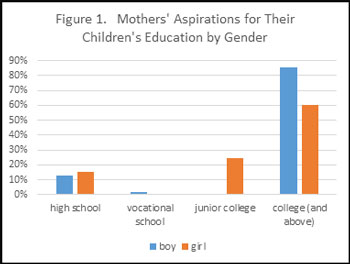 |
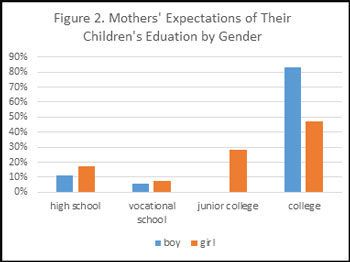 |
Do Smart Girls or Boys Give A Good Impression?
Why do mothers continue to hold lower educational aspirations and expectations for their daughters than for their sons? In a previous study conducted 15 years ago, some women expressed negative impressions of smart and high-achieving girls. Some mothers were worried that high-achieving girls might not be perceived as cute and thus be disadvantaged in the marriage market (Yamamoto, 2016).
Does this mean that smart girls are not perceived positively in Japan? In other words, are smart or academically competent children perceived differently depending on their gender? We explored mothers' evaluations of smart and academically competent girls and boys, and found that there was not a difference in mothers' impressions of smart boys versus smart girls. While 39% of the mothers agreed with the statement, "smart (atama ga ii) boys give a good impression" (by rating the question 4 or 5 on a scale from 1 to 5), 37% of the mothers agreed with the statement for girls (Figure 3). When we asked if academically competent (benkyou ga dekiru) children give a good impression, 44% of the mothers agreed with such a statement for boys and 38% of the mothers agreed with the same statement for girls. However, a significant gender gap appeared when we asked mothers about values placed on education. While 46% of the mothers agreed with the statement, "higher education (gakureki) is important" for boys, only 23% of the mothers agreed with the same statement for girls (Figure 3).
These results suggest that current mothers hold higher expectations for their sons than for their daughters because they perceive that values of higher education are different for men and women. Mothers tend to believe that higher education is more critical for boys than for girls.
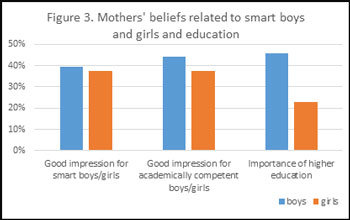 |
Mothers' Investment in Children's Education and Lessons
Do mothers invest in their children's enrichment and extra-curricular lessons differently depending on the child's gender? Despite the gender gap found in mothers' educational expectations and values placed on educational attainment, mothers' investment in their children's education and enrichment activities did not differ depending on a child's gender. In our study, mothers with higher family income were likely to invest in their children's lessons more, probably because private lessons require financial resources. Mothers of boys and girls reported a similar amount of expenses for their children's private lessons. About 30% of the mothers spent 10,000 yen to 15,000 yen per month, and about 24% of the mothers spent 5,000 yen to 10,000 yen per month for their first-grade child's private lessons. Also, a similar amount of time was spent by both boys and girls for their extracurricular lessons. Children, on average, had about two extracurricular lessons, and spent about two to three hours per week for those lessons.
However, when we looked at what types of lessons these children received, patterns were different depending on the child's gender (Figure 4). Sports, was popular for both boys and girls compared to other extra-curricular activities, but sports was much more popular for boys than for girls. Girls were more likely to take dance/ballet, music, or English lessons than boys, while boys were more likely to take calligraphy/abacus lessons than girls. In our study, girls were slightly more likely to participate in academic lessons such as kumon or juku than boys. When children are young, mothers may invest more in their children's enrichment activities, such as sports and music, than academic lessons. As children get older, academic lessons might become more common for boys than for girls. As one mother, Miki, noted in her interview, when her daughter was in the fourth grade, "If she were a boy, I wouldn't be as relaxed as I am now. I will probably send my child to juku [extracurricular academic lessons]."
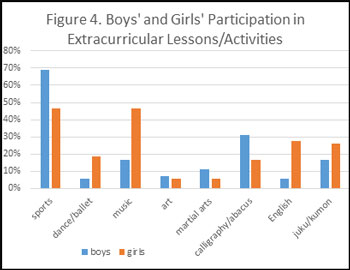 |
A License or Vocational Skill? Daughters' Future Work and Life
Why do mothers perceive that higher education is more important for boys than for girls? Do current mothers still expect their daughters to stay at home and not work in the future? After analyzing the surveys and interviews collected from the mothers, we found that the answer is NO. Work was included in current mothers' outlook of their daughters' future. Twelve years ago, most mothers did not talk about their daughters' future in relation to work. To the contrary, current mothers take it for granted that their daughters will get a job after graduating from high school or college.
Regardless of their children's gender, a lot of mothers wanted their children to find and pursue what they would like to do for their work in the future. However, about 26% of the 54 mothers with a daughter also reported that they wanted their daughters to get a job that requires a license or vocational skill (teni shoku), compared with only 9% of the mothers of boys.
Saiko is one of the mothers who wanted her daughter to pursue a job that requires a license or vocational skill, but did not expect college education for her daughter. In this section, we delineate Saiko's socialization processes, work and educational experiences, and her expectations of her daughter's education and work.
Saiko, who has three daughters, is one of the mothers who perceived her daughters' future in relation to both employment and motherhood. Growing up, Saiko had a mother who stayed at home and valued housekeeping. Her mother made delicious meals three times a day, and kept the house clean, organized, and decorated with seasonal flowers. However, from a young age, Saiko aspired to get a job when she grew up because she did not want to become like her mother who had "the role only of a mother and wife." To her, her parents "did not seem to have an equal relationship" because her mother did not work and her father did not respect her mother. She said, "I wanted to have my own job, use my ability in society, and exchange my ideas equally with my husband to be like a partner." However, she married her husband right after graduating from college and then became a mother. After having two daughters, she decided to work part-time as a staff member for a therapy group. Through this work, she aspired to pursue a graduate degree, so she started an M.A. program after her third daughter entered preschool.
When I first interviewed her, she was a student; but by the third interview, she had completed the M.A. program and started a job as a school psychologist. Saiko expected her daughter to get a job and work in the future. When I asked about her target future for her daughter, she said, "I want her to have a job that suits her. I want her to enjoy her life." She thought that a nurse might be a good job for her third daughter (the target child), because it is relatively easy for women to get a job in nursing, easy to find a job even after raising children, and pays well compared to other jobs women can get. Her daughter, "who is cheerful, caring, and can get along with anyone" also seemed to opt for a job in which she is caring for others. Saiko did not expect her daughters, especially the third one who did not enjoy schoolwork, to attend college. She believed that college attendance would depend on each child's personality, academic interests, and motivation. She told me that she would support and pay for college education if her daughters wanted to go to college. But if her daughters did not want to go, college education is not necessary. She mentioned a vocational education track to become a nurse for her daughter. She emphasized the importance of her daughter finding a way to be herself (jibunrashii). When asked if she would have the same educational expectations if she had a son, she quickly said no and noted that she would expect a boy to attend college. She stated:
I think that it's harder for boys to survive in society. My second daughter, for example, has a dream of having a happy family life [by becoming a stay-at-home mother] in the future. And girls can have that kind of option, like to be a spouse and that kind of idea. But boys have to get a good job, and have to pave his own path by himself. I would probably be more worried about that (college education) if I had a boy.
Saiko's case demonstrates processes through which a woman questioned and negotiated the traditional gender-roles in a changing Japanese society. She perceived that having a job rather than staying at home for family members was a way to build a happy family life, especially through an equal relationship with her husband. At the same time, her expectations were constructed upon traditional gender roles, particularly men as breadwinners.
Like Saiko, many of the mothers, regardless of their socioeconomic status, wanted their daughters to pursue a job that requires a national license or vocational skill, such as a nurse. They mentioned that such a job would make it easy for a woman to find a job after raising children. These narratives reflect changing perceptions about women's life course among mothers. Compared to mothers with young children who were researched about a decade ago (Holloway et al., 2005; Yamamoto, 2016), most mothers in our study expected their daughters to get a job and continue to work in the future. In other words, they perceived work to be included in their daughters' life course.
However, their expectations also reflected unchanging beliefs about traditional gender roles. They assumed that their daughters would take a break during child-rearing. The fundamental belief here is a strong responsibility placed on mothering, especially for young children, over career. They expected their daughters, and not sons, to take a break during the period of child-rearing. While some mothers, including Saiko, mentioned the possibility of their daughters not marrying in the future, most women I interviewed expected their daughters to marry and raise their children. And most mothers expected their son to provide financial support to his family members, wife and children, through work in the future. In a sense, educational attainment continues to be perceived as a tool for survival for men; it allows them to get a good job with enough income to support his family in the future, but the same is not necessarily true for women.
Discussion
Compared to the study conducted about a decade ago, more mothers seem to expect their daughters and sons to attend college. However, a gender gap in mothers' educational expectations still exists. Most mothers interviewed for this study believed that their daughters would work in the future. Participation in the labor market was included in the mothers' outlook of their daughters' life course.
However, many of them expected their daughters to focus on child-rearing, especially when they have small children. To balance work and family life, and to find a job after taking a break to raise young children, significant numbers of mothers wanted their daughters to pursue a career that requires a license or vocational skill. Such focus on vocational training or vocational skills might lower mothers' expectations for their daughters' educational attainment, compared with expectations than for their sons', as higher education is not necessary for some vocational tracks. Even though women's beliefs related to work and family have been changing, many mothers still seem to believe that placing priority on work is a desirable lifestyle for men, but not for women with children.
Note: Mothers' names presented in this paper are pseudonyms.References
- Gender Equality Bureau Cabinet Office. (2015). Danjyo kyōdō sankaku hakusho (gaiyōban) heisei 27nenban. Available from http://www.gender.go.jp/about_danjo/
whitepaper/h27/gaiyou/html/honpen
/b1_s06.html - Holloway, S. D., Yamamoto, Y., & Suzuki, S. (2005). Exploring the gender gap: Women speak out about working and raising children in contemporary Japan. Child Research Net. http://www.childresearch.net/papers/
parenting/2005_03.html - Ministry of Health, Labour and Welfare. (2015). Heisei 27 nenban kokumin seikatsu kisochousa no gaikyou. Available from http://www.mhlw.go.jp/toukei/saikin/hw/k-tyosa/k-tyosa15/index.html.
- National Center for Education Statistics. (2016). The condition of education 2016. Available from http://nces.ed.gov/programs/coe/indicator
_caa.asp. - OECD. (2015). Labour force statistics by sex and age indicators: Employment-population ratios [Data file]. Available from https://stats.oecd.org/Index.aspx?DataSetCode=LFS_SEXAGE_I_R#
- Yamamoto, Y. (2016). Gender and social class differences in Japanese mothers' beliefs about children's education and socialisation. Gender and Education, 28(1), 72-88.
Acknowledgment. This research was assisted by a grant from the Abe Fellowship administered by the Social Science Research Council and the American Council of Learned Societies in cooperation with and with funds provided by the Japan Foundation.



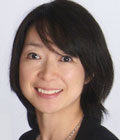 Yoko Yamamoto
Yoko Yamamoto Yukiko Watanabe
Yukiko Watanabe










